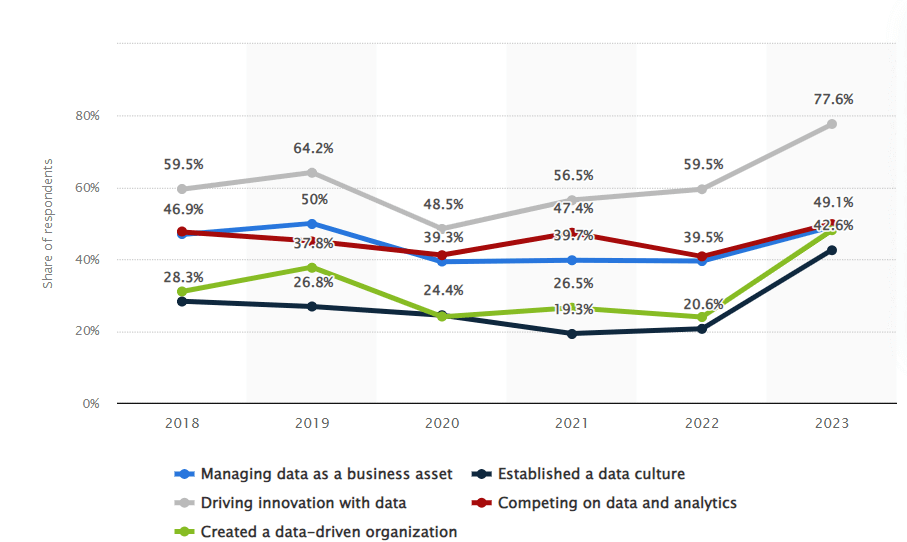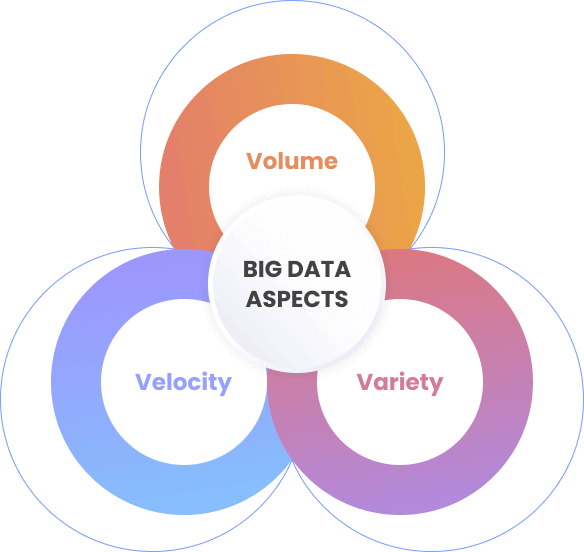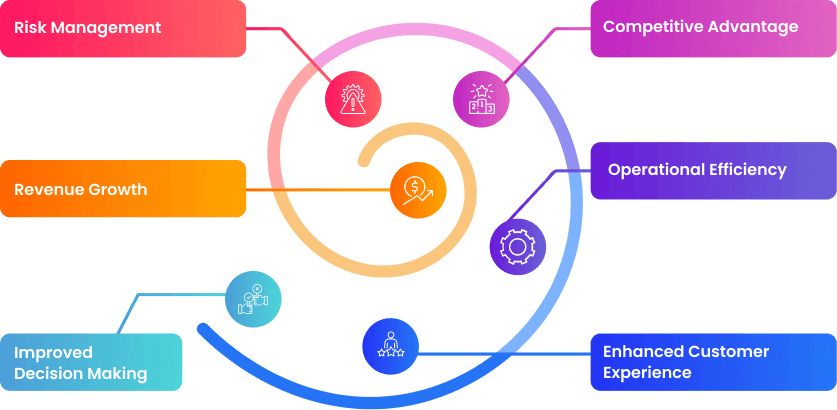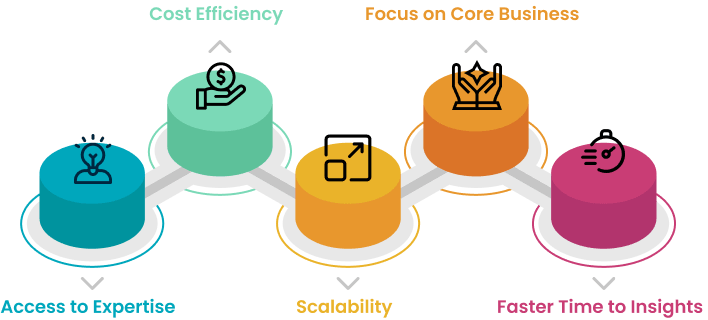In today’s digital age, businesses generate an enormous amount of data daily. This data, often referred to as “big data,” holds immense potential for those who know how to analyze it effectively.
Statista quotes that according to a 2023 global survey, an increasing share of businesses believe they are making effective use of data. Over three-quarters of respondents said that they were driving innovation with data, while half considered their businesses to be competing on data and analytics.

Source: Statista
Big data analytics is the process of examining large and varied data sets to uncover hidden patterns, unknown correlations, market trends, customer preferences, and other valuable business information. Understanding and leveraging big data analytics can be a game-changer for businesses looking to stay competitive in an increasingly data-driven world.
What is Big Data Analytics?
Big data analytics involves using advanced analytic techniques against very large, diverse data sets that include structured, semi-structured, and unstructured data, from different sources, and in different sizes from terabytes to zettabytes.
Here’s a breakdown of the key aspects of big data:

- Volume: Large datasets, often in terabytes or petabytes, that traditional data management systems struggle to handle.
- Variety: Data comes in various formats, including structured (e.g., databases), semi-structured (e.g., log files), and unstructured (e.g., social media posts).
- Velocity: Data is constantly generated and needs to be processed quickly to derive real-time insights.
On the other hand, big data analytics focuses on drawing insights from data to make better decisions, enhance operations, and provide new products and services.
Key Components of Big Data Analytics
Data Sources: Data can come from various sources including social media, sensors, devices, video/audio, networks, log files, transactional applications, web, and more.
- Data Storage: This involves storing large volumes of data using technologies such as Hadoop, NoSQL databases, and cloud storage solutions.
- Data Processing: Processing large datasets can be done in batch processing or real-time processing using tools like Apache Spark and Storm.
- Data Analysis: Applying analytical techniques and models to identify patterns and insights. This can include predictive analytics, machine learning, and statistical analysis.
- Data Visualization: Tools like Tableau, Power BI, and others help in visualizing the data to make the insights easily understandable and actionable.
Why You Need Big Data Analytics
Data is a new fuel in today’s fast-paced digital world. There are myriad reasons to move to big data to ensure the steady and strategic growth of your business.
Here are some of the primary ones listed:

Improved Decision Making
Big data analytics empowers organizations to make data-driven decisions. businesses can make informed choices that enhance efficiency, optimize operations, and improve customer satisfaction by analyzing trends and patterns. For example, retailers can analyze customer purchase data to optimize inventory and marketing strategies.
Enhanced Customer Experience
Understanding customer behavior through data analytics helps in providing personalized experiences. Companies can analyze customer interactions and feedback to tailor their offerings to meet individual needs; thus, they can increase customer loyalty and satisfaction.
Operational Efficiency
Data analytics can uncover inefficiencies in business processes and operations. When businesses choose to outsource BI analysts, they can streamline operations, reduce costs, and improve overall productivity by identifying bottlenecks and areas of improvement. For instance, predictive maintenance in manufacturing can significantly reduce downtime and maintenance costs.
Competitive Advantage
In the highly competitive business landscape, those who leverage big data analytics gain a significant edge over their competitors. By staying ahead of market trends and consumer demands, businesses can innovate faster and offer better products and services than their competitors.
Risk Management
Big data analytics can be used to identify and mitigate risks. By analyzing patterns and trends, businesses can predict potential risks and take proactive measures to mitigate them. This is particularly useful in industries like finance, insurance, and healthcare where risk management is crucial.
Revenue Growth
Data analytics can help businesses identify new opportunities for revenue growth. By understanding market trends and consumer preferences, companies can develop new products, enter new markets, and create targeted marketing campaigns that drive sales and increase revenue.
Looking for expert Big Data Analytics services?
WeblineIndia’s team is equipped to turn your data into strategic assets. Get in touch with us now to discuss your needs.
Applications of Big Data Analytics
Healthcare
In healthcare, big data analytics is used to improve patient outcomes, manage hospital operations efficiently, and conduct medical research. For example, predictive analytics can help predict disease outbreaks and patient readmissions, improving preventive care and resource allocation.
Retail
Retailers use data analytics to optimize supply chain operations, manage inventory, personalize marketing efforts, and enhance customer experiences. Analytics helps in understanding buying patterns and preferences, leading to better product recommendations and targeted promotions.
Finance
The finance industry leverages data analytics for fraud detection, risk management, customer segmentation, and investment strategies. By analyzing transaction data, financial institutions can detect unusual patterns that may indicate fraudulent activity and take preventive measures.
Manufacturing
Manufacturers use big data analytics for predictive maintenance, quality control, and supply chain optimization. Analytics helps in predicting equipment failures, reducing downtime, and ensuring product quality, leading to more efficient manufacturing processes.
Marketing
Marketing departments use data analytics to understand consumer behavior, measure campaign effectiveness, and optimize marketing strategies. By analyzing data from various channels, marketers can create more targeted and personalized campaigns, improving customer engagement and conversion rates.
Why Outsource Data Analytics?
Outsourcing data analytics can be a strategic move for businesses looking to leverage the full potential of their data without the need to invest heavily in infrastructure and talent. Here are some compelling reasons to outsource data analytics:

Access to Expertise
Outsourcing to a data analytics company gives you access to a team of experts with specialized skills and experience in handling large datasets and advanced analytical techniques. These professionals stay updated with the latest trends and technologies in the field, ensuring that your business benefits from cutting-edge software solutions.
Cost Efficiency
Building an in-house data analytics team and infrastructure can be expensive and time-consuming. By outsourcing, you can significantly reduce costs related to hiring, training, and maintaining a team, as well as investing in the necessary technology and tools.
Scalability
An offshore data analytics company can provide scalable solutions that grow with your business. Whether you need to analyze small datasets or handle massive volumes of data, outsourced services can be scaled up or down based on your requirements, ensuring flexibility and cost-effectiveness.
Focus on Core Business
By outsourcing data analytics, your internal teams can focus on core business activities without being burdened by the complexities of data management and analysis. This allows you to allocate resources more effectively and drive growth in key areas of your business.
Faster Time to Insights
Data analytics service providers have the expertise and tools to process and analyze data quickly, delivering actionable insights faster than an in-house team. This can help you make timely decisions and stay ahead of the competition.
WeblineIndia: Your Trusted Data Analytics Partner
When it comes to outsourcing data analytics, WeblineIndia stands out as a leading provider of big data analytics services. With years of experience and a team of skilled professionals, we offer comprehensive data analytics solutions tailored to meet the unique needs of your business.
Why Choose WeblineIndia?
- Expertise: Our team of data scientists and analysts are proficient in the latest analytical tools and techniques, ensuring that you get the best insights from your data.
- Customized Solutions: We understand that every business is different. Our solutions are customized to address your specific challenges and goals, providing maximum value.
- Advanced Technologies: We leverage advanced technologies and platforms to deliver robust and scalable data analytics solutions that drive business growth.
- Proven Track Record: With a proven track record of successful projects across various industries, we have the experience and knowledge to handle complex data analytics tasks.
- Cost-Effective: Our services are designed to be cost-effective, providing you with high-quality data analytics solutions without breaking the bank.
In conclusion, big data analytics is essential for businesses looking to gain a competitive edge, improve decision-making, and drive growth. Outsourcing data analytics to a trusted partner like WeblineIndia can help you unlock the full potential of your data, providing you with the insights you need to succeed in today’s data-driven world. Contact us today to learn more about our data analytics services and how we can help your business thrive.
Ready to make data-driven decisions?
Our Big Data Analytics experts at WeblineIndia can help you uncover hidden trends and patterns.
Social Hashtags
#BigData #DataAnalytics #DataScience #AnalyticsInsights #BigDataRevolution #BusinessIntelligence #DataDriven #DataInnovation #DataAnalysis #BigDataForBusiness
Testimonials: Hear It Straight From Our Global Clients
Our development processes delivers dynamic solutions to tackle business challenges, optimize costs, and drive digital transformation. Expert-backed solutions enhance client retention and online presence, with proven success stories highlighting real-world problem-solving through innovative applications. Our esteemed Worldwide clients just experienced it.
Awards and Recognitions
While delighted clients are our greatest motivation, industry recognition holds significant value. WeblineIndia has consistently led in technology, with awards and accolades reaffirming our excellence.

OA500 Global Outsourcing Firms 2025, by Outsource Accelerator

Top Software Development Company, by GoodFirms

BEST FINTECH PRODUCT SOLUTION COMPANY - 2022, by GESIA

Awarded as - TOP APP DEVELOPMENT COMPANY IN INDIA of the YEAR 2020, by SoftwareSuggest